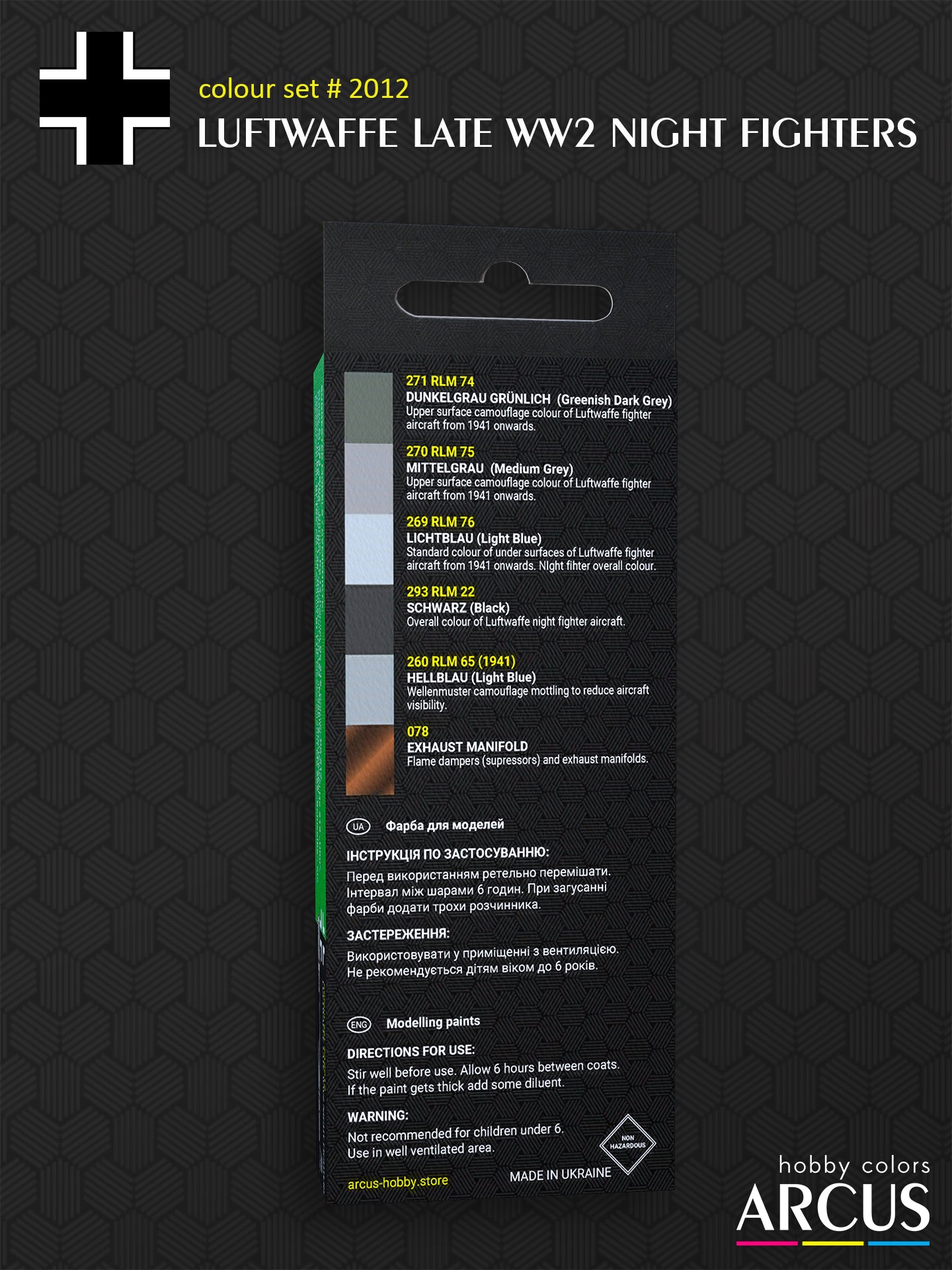Arcus Hobby
Paint Set 2012 Luftwaffe Late WW2 Night Fighters
无法加载取货服务可用情况
Luftwaffe Late WW2 Night Fighters
In the latter part of World War II, the Luftwaffe confronted a pressing need for formidable night fighters to counter the relentless Allied bombing raids. Among the notable aircraft deployed in this role was the Heinkel He 219 Uhu (Owl). This twin-engine marvel, armed with the sophisticated SN-2 radar, played a pivotal role in intercepting and engaging Allied bombers under the cover of darkness. The He 219's lethal combination of advanced radar technology and heavy armament made it a formidable opponent in the night skies.
Another significant addition to the Luftwaffe's night-fighting arsenal was the Messerschmitt Me 262. Originally conceived as the world's first operational jet-powered fighter, the Me 262 underwent adaptations to fulfill the role of a night fighter. The Me 262B-1a/U1 variant, equipped with the Neptun radar, represented the Luftwaffe's attempt to stay ahead of evolving demands in nighttime aerial warfare. Despite the groundbreaking performance of the Me 262, production challenges and limited operational availability restricted its widespread use as a night fighter.
In tandem with these advanced aircraft, the Messerschmitt Bf 110G-4 and the Junkers Ju 88G series continued to serve as stalwarts of the Luftwaffe's nocturnal defense. Outfitted with radar systems and potent armaments, these aircraft exemplified the Luftwaffe's commitment to adapting to the challenges posed by night operations.
Amidst the complex and perilous nocturnal battles, the Luftwaffe produced remarkable night fighter aces. Major Heinz-Wolfgang Schnaufer emerged as the leading night fighter ace, amassing an impressive 121 aerial victories. Noteworthy figures like Major Heinz Strüning and Oberleutnant Kurt Welter also made significant contributions to the Luftwaffe's defense of the night skies.
However, despite the technological advancements and the skill of these night fighter aces, the Luftwaffe faced insurmountable challenges. Resource shortages, manpower constraints, and the overwhelming numerical superiority of the Allied air forces contributed to the decline of the once-formidable Luftwaffe night fighters. In the waning days of the war, the struggle for control of the night skies reflected the broader challenges faced by Germany in the final stages of World War II.
Use Guide for the Set Luftwaffe Late WW2 Night Fighters
- Beginning in 1941, a new camouflage scheme was introduced for Luftwaffe night fighters.
- The camouflage scheme for night fighters involved a complete paint job in the light blue color RLM 76. The upper surfaces were additionally covered with mottling in the gray colors RLM 74 and RLM 75.
- Some aircraft were finished in the Luftwaffe camouflage scheme for day fighters, which involved camouflaging the upper surfaces in RLM 74 and RLM 75 over the light blue lower surfaces in RLM 76.
- On some aircraft, such as the He 219, the upper surfaces could be entirely painted in violet-gray RLM 75 with small mottles of RLM 76.
- For additional camouflage, Luftwaffe night fighters could use the light blue bomber color RLM 65.
- At the end of World War II, some night fighters were given black lower surfaces for better camouflage against the night sky.
Set Luftwaffe Late WW2 Night Fighters Includes:
- 271 RLM 74 Dunkelgrau Grünlich (Dark Greenish Gray ) - a dark greenish-gray color used for the upper surfaces camouflage.
- 270 RLM 75 Mittelgrau (Medium Gray) - a violet-gray camouflage color of the upper surfaces.
- 269 RLM 76 Lichtblau (Light Blue) - a light blue paint used for the complete coloring of night fighters.
- 293 RLM 22 Schwarz (Black) - an alternative black coating of the lower surfaces.
- 260 RLM 65 Hellblau Ausg. 1941 (Light Blue ver. 1941) - an alternative light blue color of the camouflage mottling on the upper surfaces.
- 078 Exhaust Manifold - unpainted exhaust manifolds and flame suppressors.
Collection:
This Set is Best for:
- Arado Ar 234 "Blitz"
- Dornier Do 17
- Dornier Do 215
- Dornier Do 217
- Focke-Wulf Fw 190 "Würger"
- Focke-Wulf Ta 154 "Moskito"
- Heinkel He 219 "Uhu"
- Junkers Ju 88
- Junkers Ju 188 "Rächer"
- Junkers Ju 388 "Störtebeker"
- Messerschmitt Bf 109
- Messerschmitt Bf 110
- Messerschmitt Me 262 "Schwalbe", etc.
Paint Type:
- Acrylic A2012
- Enamel E2012
Paint Finish:
- Semi-gloss
Capacity:
- 6 x 10 ml. (6 x 0.33oz)





